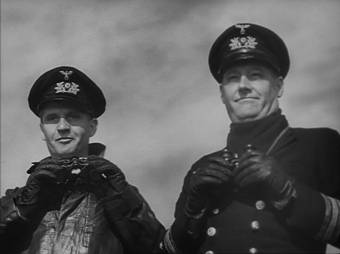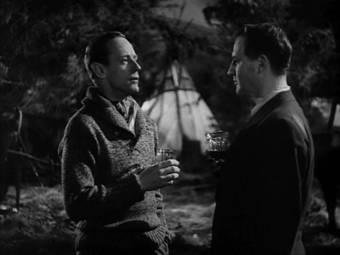| |
'David Lean, who had access to all the guide-tracks and soundtracks when he was editing the film, dines out on what happened next. Amid a crossfire of orders and recriminations, he imitates Eric's panic stricken yell, "You bastard, you'll kill us all for your damn movie!" echoing over the water. And then a little voice just beside the camera saying "Keep rolling."' |
| |
Michael Powell in his autobiography, A Life In Movies |
Ah,
how sweet to find evidence of that singular passion, the
passion that creates a scenario in which an actor is in
fear of his life over something as inconsequential and
supremely powerful as a movie. Powell's little "Keep
rolling," says it all. Principal actor Eric Portman
was nervous of Powell but as this could only help sharply
define the sickeningly nasty character he was playing,
I wondered if Powell ever bothered to disabuse him.
Movies
are made embedded in all manner of contexts. It's fair
to say that the Second World War was a giant context,
one that we comfortable baby-boomers onwards just experience
third and fourth hand through newsreels and movies. The
Holocaust was some raging, unspeakable nightmare within
that war and even from a distance of sixty years, it's
still a great shock that a nation could be so completely
swayed by a maniac's vision. At least Bush's approval
rating is low right now which says something positive
about the American people. In fact, on the day of writing
this, the African-American population of the US turns
in a Bush Approval Rating of (oh joy) a mere and very
minor 2%… The Big Easy has spoken. Can everyone
else speak a bit louder now?
49th
Parallel is Allied propaganda, no doubt, but
it's also a fine movie. This is no Riefenstahlian triumph
of the repetitive lie. It's a great British film-maker
and his great Hungarian writing partner making an entertainment
that gives colour and shade to moral principles deemed
so important faced with such an enemy in wartime. Of the
band of Nazis on the run in Canada, only one has slivers
of humanity poking through (for this transgression he
is summarily executed) and the others are just kids whose
souls have been snapped. In their place are frightened,
inexperienced Nazi engines. Their leader (Portman) has
the awful swaggering confidence of supreme arrogance.

Funded
by the British government in the midst of the Second World
War, 49th Parallel is a liberal hearted
pleasure and a damn fine war movie to boot. Off the coast
of Canada (P&P certainly got about a bit), a U-Boat
surfaces. Their captain surveys the boat they've just
wrecked treating the survivors like scum. These men are
Nazis and therefore very easy to despise. Lieutenant Hans
Hirth (an all too believable, cold, hard Eric Portman)
is sent ashore to secure supplies from the Hudson Bay
Trading post. But what's this? The entire Canadian air
force, all three bombers (and this was true if Powell's
memoirs are to believed) send the U-Boat to hell and I
can't tell you how refreshing it was to see what looks
like a real U-Boat going kaboom (it was, in fact, a full
size prop that almost brought the production down when
Newfoundland customs wanted to charge the film makers
$22,000 to bring it over the border). Film making, tchah.
Cut
off from their metallic haven, the Nazis now find themselves
in hostile territory – or do they? In a series of narrative
steps, our Nazis encounter different examples of 'free'
men living lives dictated to by nothing but the vagaries
of the weather and height of the corn stalks. In short,
they are to be given life lessons by the effortlessly
good people of the Allies and each has a point and the
only Nazi to be affected is the one truly rounded human
being of the bunch. At first they hole up at the Hudson
Bay shop and take hostages, the older owner and a trapper
who's fresh (not the right word for a man who has spent
two years trapping and living rough) from his work. Slowly
he is filled in about the Nazi threat only moments later
to have six of them take him prisoner.
A short digression. I have enormous respect for the acting
profession. I also can understand how extraordinary it
is when a Brando blossoms or a Pacino punches through.
There are defining performances and one man stands taller
than most. This particular actor was, in his lifetime,
regarded as the greatest actor of them all. His fame drew
from astonishingly powerful performances that helped to
turn him into a household name (well, the performances
and the fact he snared the most ravishing creature for
his wife, the Audrey Hepburn of her decade). Yes, it's
Laurence Olivier and Vivien Leigh. But those performances
were all theatrical – even on film. I could never be comfortable
with Olivier because of that clipped but strident delivery,
that Shakespearean über-projection that made each
syllable sound like it had its own appreciation society.
That said, he was chillingly brilliant as 'the White Angel'
in John Schlesinger's Marathon Man.
And
here he his, unbelievably miscast (forgive me) as a French
Canadian, flouncing about the screen sounding like Steve
Martin with a comedy accent. You simply cannot take this
man seriously and it punches the movie in the solar plexus
a bit but Portman remains ice cold and so the movie is
carried along with him. A few airmen are sent to check
out the outpost and together with the Eskimo villagers,
they are all despicably gunned down as they run for their
lives. The propaganda is at full force here as we see
a mother and child lying dead.
The
Nazis are thinned out as they try to escape in the Canadian
seaplane and when an terrible oversight tells the men
all cramped in a small cabin that their plane is about
to crash, it's real sweaty palm time. Powell works wonders
with just a small area (he gives us a interior reverse – from behind the stricken Germans – of the plane lurching
in the air which is uncomfortable and wrenching). The
crash itself is handled superbly well (echoing Hitchcock's
one take crash into water a year earlier in Foreign
Correspondent). From here the Nazis are taken
in by a German contingent, full of Amish-lite, fresh faces
who work the land. It's here that the only human Nazi
makes the misstep of going back to what he used to love
(baking) before the war scooped him up. Completely misreading
his hosts, Portman delivers his racial purity speech which
goes down (now, correct me if I'm wrong but should it
be 'goes up' like a lead balloon?) I mean a lead balloon
goes down superbly well. I digress. The leader of the
village, David, played by Anton Wallbrook, gives as good
as he gets and again, as per his immigration speech in The Life and Death of Colonel Blimp,
he stops the movie in the best way just to have us admire
passionate and achingly 'real' acting.

Fleeing
to Winnipeg, the remaining Nazis witness a native American
parade (shades of Powell foreshadowing the Holocaust atrocities
via America's settlers' treatment of the Indians? Tempting
to go there but no one knew of the final solution in 1941.
It officially came into being after a famous meeting in
January 1942). It is now left to Portman and one other
survivor to face two of the Nazis' biggest threats. England
and the United States. The absolute Englishman, the actor
for whom the word 'personification' was created dons his
pads and steps up to bat. This is Leslie Howard and everything
about him screams middle class privilege. Portman belittles
him, accusing him of cowardice. He baits Howard into a
petty argument and Howard's enlightened response is worth
quoting: "We've been given reasoning powers. Why
don't we use them instead of hitting each other?"
But the 'spiteful little schoolboys' tie him up and flee.
Portman escapes but so does Leslie Howard (with the terribly,
terribly English moniker 'Philip Armstrong Scott' just
watch the Union Jack jumping at those syllables). Cornered,
the penultimate Nazi starts firing. Howard walks towards
the gunman and coolly counts down the remaining bullets
as they are fired at him. This was concrete upper lip
time and although somewhat unbelievable, I bet it gave
'our boys' a boost to see what 'an unarmed decadent democrat'
could do against an 'armed superman'. He gets hit by one
bullet but as we now all know, you don't just slam your
hand on where you think you've been hit and then limp
a tiny fraction for the rest of the movie. Powell is forgiven.
Finally,
Portman stows away on a freight train to be confronted
by the very personification (these actors personify, honestly)
of the mighty United States of America, Raymond Massey.
To reveal more would be churlish of me. 49th Parallel
is one solid stare at 'good and evil', the analogy of
the nasty strain of disease (Nazism) invading a healthy
host (Canada) and how that health fights back. It's also
a very entertaining romp and a first class Archers picture.
This
repackaged Silver Collection disc is comparable to their A
Canterbury Tale (also repackaged
for this collection). The print is only a few notches
above shabby with lots of dirt and scratches evident.
The blacks come through well but the print is a little
thin.
The
Dolby 2.0 processed soundtrack is fine as in everything
has come from the original mono intact. The subtitles
are intact and clear and mercifully drop shadowed but
only just.
As
it's the Silver Collection again, I expected the trailer to be their own corporate one but no! It's the real trailer
and a fine example of the genre too.
|